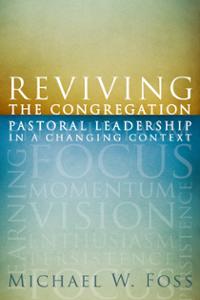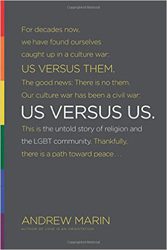 Leadership is a spiritual issue, especially in congregational life. As Michael Voss notes in his Reviving the Congregation, pastoral leadership involves not only a pastor’s skills but also her or his personal well-being and spiritual life. Pastoral excellence is skill centered and we should always aim at excellence, as Voss notes. But, this excellence ultimately involves the person of the pastor. Her or his prayer life, vision, relationships, overall well-being, response to conflict, and reaction to the stress can either make or break a minister’s career. Many skilled pastors leave ministry because of discouragement, stress, and spiritual dryness. Today, ministry is more challenging than ever, with the realities of postmodernism, pluralism, and changes in the spiritual landscape, not to mention technological and financial issues, confronting virtually every pastor. We cannot change these external stressors but we have the freedom to respond to the realities of our situation through practices of healthy spirituality.
Leadership is a spiritual issue, especially in congregational life. As Michael Voss notes in his Reviving the Congregation, pastoral leadership involves not only a pastor’s skills but also her or his personal well-being and spiritual life. Pastoral excellence is skill centered and we should always aim at excellence, as Voss notes. But, this excellence ultimately involves the person of the pastor. Her or his prayer life, vision, relationships, overall well-being, response to conflict, and reaction to the stress can either make or break a minister’s career. Many skilled pastors leave ministry because of discouragement, stress, and spiritual dryness. Today, ministry is more challenging than ever, with the realities of postmodernism, pluralism, and changes in the spiritual landscape, not to mention technological and financial issues, confronting virtually every pastor. We cannot change these external stressors but we have the freedom to respond to the realities of our situation through practices of healthy spirituality.
How do we refresh our ministerial spirit? There is no one pathway toward wholeness just as there is no one ideal for pastoral ministry. Still, among the many pathways toward wholeness, let me suggest a few practices that can change your ministry and your life. In so doing, I am elaborating on certain points brought up in Voss’s excellent text.
First, see all the various tasks of ministry as opportunities for spiritual transformation. We can pray our e-mail, newsletter preparation, marketing, budget preparation, and administration. If God is omnipresent, then we can, in principle, deepen our awareness of God in every pastoral task, even those that otherwise might bore us. We can, with Gerald May, pause, notice, open, yield and stretch, and respond to God in every encounter. (For more on this approach, see Gerald May, The Awakened Heart and Bruce and Katherine Epperly, Tending to the Holy: The Practice of the Presence of God in Ministry).
Second, we can let go of our need to have an unbending agenda, to have things go our way, and open to God’s various movements and possible outcomes in our lives. Agenda-driven ministry is bound to be stress-filled because it has one clear idea of success. It must achieve its goals, and if goals aren’t achieved we feel like professional failures. There is some virtue in purpose-driven ministry, but at times the best ministry is “purposeless” in its trust of divine synchronicity and openness to the sacrament of the present moment. (de Caussade). Following the wisdom of the Serenity Prayer, we discover the possibilities inherent in every encounter and task, even those beyond our control. We discover that God’s vision may be different than our plans, indeed, God promises more than we can ask and imagine, and what look like dead ends may open up to new horizons.
Third, we can make the practice of preaching central to our spiritual lives. Preaching is the most sustained spiritual and intellectual practice for most pastors. For over 45 weeks each year, most solo or senior pastors, like myself, pore over the scriptures, read commentaries, and respond creatively to biblical texts. Most pastors write more than 200 pages of sermons each year, the equivalent of a small book. Accordingly, there is good reason to see preaching as at the heart of our spiritual growth. When we connect our process of sermon preparation with quiet meditation, lectio divina, visualization, and imaginative prayer, every aspect of our preparation can contribute to our spiritual growth. I particularly like the practice of “taking my sermon for a walk”: reading the scriptures and then taking a long walk to let the scriptures soak in. In this process, I combine physical exercise with intellectual and spiritual growth. If we see our sermons as windows to personal transformation, every week becomes a refreshing and challenging spiritual adventure. (For more on this approach to preaching, see Bruce Epperly, Spiritual and Religious: A Postmodern Preaching Pilgrimage with Philippians.)
Finally, pastors need to explore what it means to be healthy and whole. There is no one norm for wellness. It is a process of feeling at home in your skin, nurturing your imagination, deepening your spirit, and inspiring your intellect. It also involves new approaches to time, which emphasize abundance rather than scarcity. Many pastors suffer from hurry and time sickness. They are always on the go, and anxious about too many tasks and too little time. Time is a matter of perspective and choice. You can be busy without feeling anxious or feeling busy. Commitment to meditative practices and prayer transforms our sense of time – we discover that all time is God’s time and that we always have enough time and energy to join faithful and excellent ministry with commitment to our families, friends, and well-being. (For more on this process of ministerial wholeness, see Bruce Epperly, A Center in the Cyclone: 21st Century Clergy Self-care.)
Michael Voss has provided a great resource for today’s pastors. He shows a pathway to church growth that goes beyond “how to” books and superficial formulae to see the connection between pastoral vision, spirituality, and relationships and faithful and excellent ministry. Voss walks the talk and provides a personal – not cookie cutter – approach to healthy and successful ministry.
Read an excerpt from Reviving the Congregation – and a Q&A with author Michael W. Foss – at the Patheos Book Club here!












